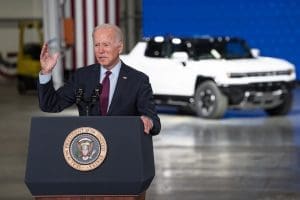Biden announces plan to reduce dependency on China for vital electric car parts
China currently produces 80% of all rare-earth metals sold worldwide.

The Biden administration announced on Tuesday that it would be directly investing millions of dollars in effort to increase domestic production of rare-earth metals, a key component in electric vehicles, most of which is currently produced by China.
The Department of Defense said that it has awarded a $35 million contract to the rare-earth metals company MP Materials, which will go toward building a facility for the production of the metals in California. The company also said that it will invest another $700 million in the project. MP Materials said that 350 jobs in the state would be created in association with the effort.
The Biden administration said in a release the project would eventually establish “a full end-to-end domestic permanent magnet supply chain” and noted China’s control of the production of rare-earth metals, which are used in “EV motors, defense systems, electronics, and wind turbines.”
In December, MP Materials announced that it had entered into a long-term agreement with General Motors to provide rare-earth magnets for use in the company’s electric motors. GM said the materials would be used in multiple models of the company’s electric vehicles and would be part of its strategy to sell over a million electric vehicles by 2025.
The announcement from President Joe Biden is the outcome of an executive order he signed in February 2021 focused on strengthening the U.S. supply chain. The supply chain has faced significant disruptions affecting the delivery of goods like personal protective equipment since the outbreak of the COVID-19 pandemic in 2020, which caused factories and distribution hubs in countries like China to shut down to prevent spread of the virus.
China currently controls at least 80% of the global market for rare-earth materials. A 2018 report from the Department of Defense concluded that China “strategically flooded the global market” for the product, driving out competition based in other nations.
Electric automobiles that use rare earth in their motors consume less battery power than cars that use standard magnets, allowing them to travel further on a charge. Automakers have previously indicated that anxiety over vehicle range has been a concern for consumers interested in purchasing these cars.
Expanding the use of electric vehicles has previously been highlighted as a goal of the Biden administration. Biden has said his goal is to have 50% of new American cars by 2030 be electric in order to reduce overall emissions of greenhouse gases.
The Environmental Protection Agency noted that in 2019 gas vehicles were the largest source of greenhouse gas emissions, which contribute to global climate change, in the United States.
Biden’s announcements reflect a change of policy from those of the Trump administration, which was hostile to electric vehicles and efforts to cut emissions. That administration did not act to prevent the expiration of a $7,500 tax credit for electric car purchases.
Additionally, former President Donald Trump attacked the use of electric cars, arguing in 2019 that “all-electric is not going to work” and disparaging them for needing to be recharged. As the Natural Resources Defense Council noted that year, “Has anyone told him that gas-powered cars also need to make regular stops for refueling?”
Published with permission of The American Independent Foundation.
Recommended

Biden calls for expanded child tax credit, taxes on wealthy in $7.2 trillion budget plan
President Joe Biden released his budget request for the upcoming fiscal year Monday, calling on Congress to stick to the spending agreement brokered last year and to revamp tax laws so that the “wealthy pay their fair share.”
By Jennifer Shutt, States Newsroom - March 11, 2024
December jobs report: Wages up, hiring steady as job market ends year strong
Friday’s jobs data showed a strong, resilient U.S. labor market with wages outpacing inflation — welcome news for Americans hoping to have more purchasing power in 2024.
By Casey Quinlan - January 05, 2024
Biden’s infrastructure law is boosting Nevada’s economy. Sam Brown opposed it.
The Nevada Republican U.S. Senate hopeful also spoke out against a rail project projected to create thousands of union jobs
By Jesse Valentine - November 15, 2023









































































